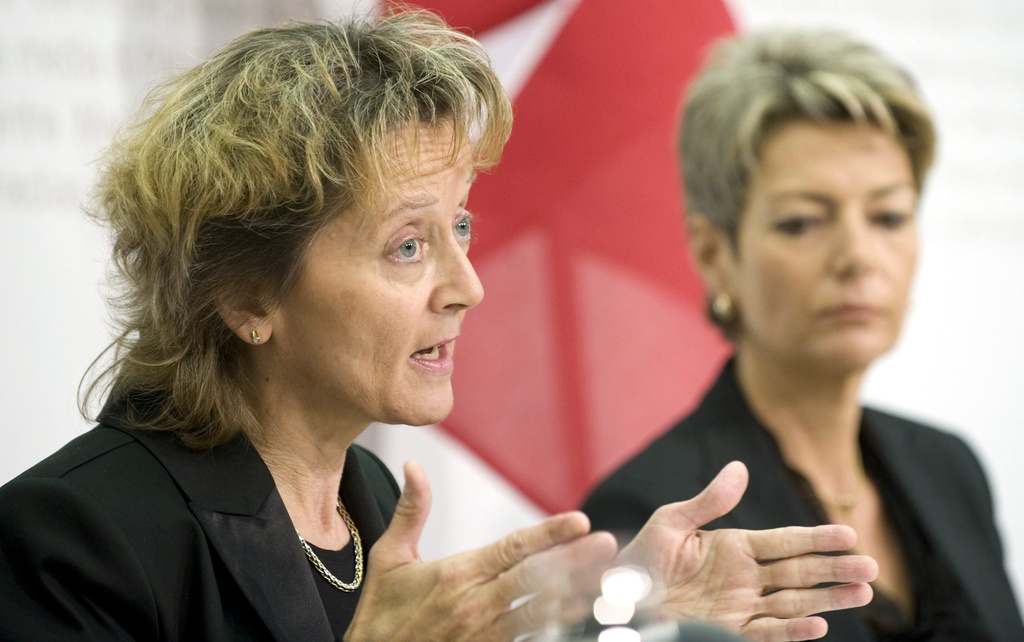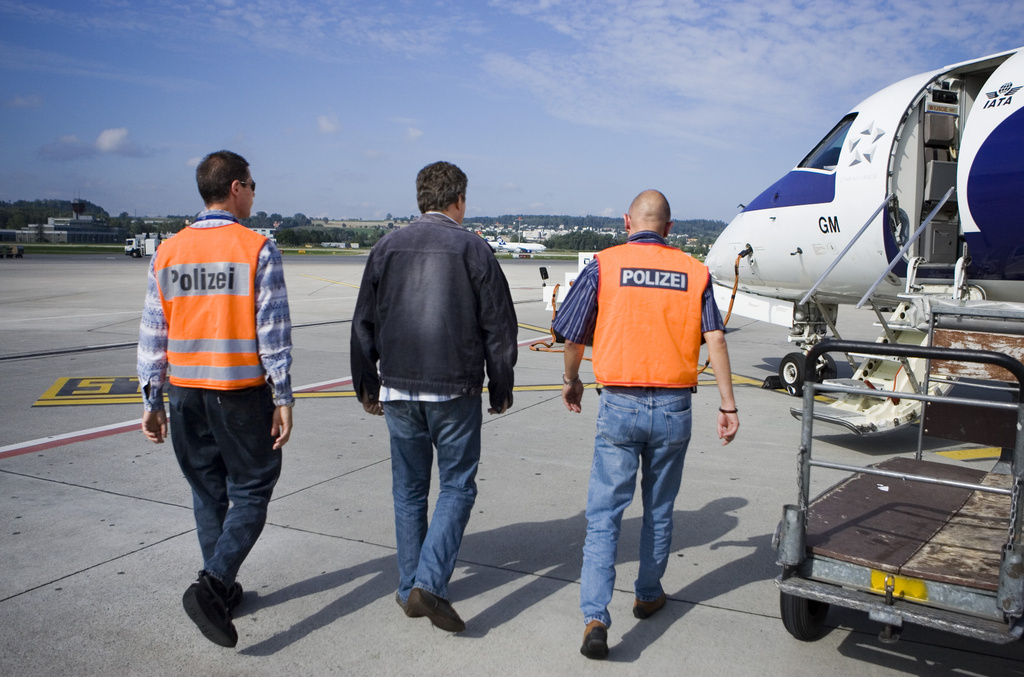Minister carries vote message to the people

It’s not every day a cabinet minister visits rural canton Fribourg, so when Eveline Widmer-Schlumpf attended a public debate in Wünnewil the locals turned out in force.
The justice minister was there to launch the government’s counter-initiative to a rightwing proposal to tighten the rules on the deportation of criminal foreigners. A nationwide vote on the issue takes place on November 28.
The choice of Wünnewil as the launch pad of the counter-initiative may not be accidental. With its 3,000 residents the village is situated in the Sense district of Fribourg, which for years has had below average turnout in nationwide votes. If the government is to succeed in November’s ballot it will need every vote it can get.
The rightwing Swiss People’s Party knows it has hit a popular nerve with its initiative to forcibly expel foreigners convicted of murder, rape, child abuse but also drug dealing, benefits fraud and break-in. But they are not taking success for granted: the cross-party committee backing the initiative has already launched a provocative poster campaign.
Pro-initiative placards featuring the image of “Ivan S., rapist” surrounded the side door to the St Jakob restaurant where the debate was held, and a table was strewn with leaflets. Widmer-Schlumpf, of the centre right Conservative Democratic Party, must have felt she was entering the lions’ den.
Although the People’s Party was well represented at the gathering, many of the around 200 locals present were open to persuasion.
“Everything has two sides – at least,” quipped Hugo Riedo, a retired laboratory worker, who told swissinfo.ch he hadn’t decided how to vote.
Young generation
Perhaps in a bid to kindle an interest in politics in the next generation of voters, local prefect Nicolas Bürgisser had invited the ninth school class to attend. Widmer-Schlumpf was invited to sit on a chair draped in the Swiss flag while the pupils grilled her on her private and political life. What did you want to be when you grew up? A paediatrician. What do you do in your free time? Walk in the mountains. Who do you get on best with in the cabinet? No comment.
Then the debate was opened, with Patrick Freudiger, a vice-president of the canton Bern youth faction of People’s Party taking the floor. At 25, Freudiger looked barely older than some of the teenagers present, but he is a seasoned politician and one of the co-initiators of last year’s successful bid to ban minaret construction.
Freudiger didn’t mince his words as he tried to convince the audience of the need for a consistent policy of expelling criminal foreigners, while pointing to a graph showing rising levels of crime committed by foreigners over the past 26 years.
“Expelling criminal foreigners is a punishment that is effective. For some foreigners from third world countries a stay in a Swiss prison may be preferable to a normal life back home,” he argued.
Soft justice?
Serious crimes required serious sentences, he said, accusing the government of “soft justice” and of presenting a “watered down initiative” in the shape of the counterproposal.
“In Switzerland we don’t have soft justice,” retorted Widmer-Schlumpf. “We have good judges, good courts and in 90 per cent of cases the justice system works well.”
The justice minister outlined the main features of the counter-initiative. Criminals sentenced to a minimum of two years in prison would face deportation but individual circumstances would be taken into account, as would humanitarian law.
“We don’t want to act arbitrarily. We won’t treat someone who has committed a minor theft in the same way as a murderer. We won’t treat a road racer who kills someone in the same way as someone who commits a minor theft.”
Similarly someone sharing cannabis with friends should not be treated like a major drug dealer, she said, pointing out that the initiative did not make the distinction.
Putting the argument for a no to both initiative and counter-proposal was the head of Fribourg’s cantonal justice department Erwin Jutzet of the centre-left Social Democrats. Jutzet talked about his difficulties under the current law on expulsions and put the case for effective integration measures.
Then it was time for questions from the audience, which reflected anxiety over organised crime and foreigners taking advantage of Swiss hospitality. A foreign shop worker made a plea for the Swiss to promote integration and benefit from its foreign population.
Open debate
When everyone had had their say local man Hugo Riedo said he had decided to vote for the counter-initiative, because it seemed the more workable option. “But it is good that the People’s Party raised the topic, so we could have an open debate,” he told swissinfo.ch.
Wünnewil resident Armin Brülhart said he was also planning on voting for the counter-proposal, although he admitted he was a member of Widmer-Schlumpf’s Conservative Democrats.
Looking relaxed, the justice minister told swissinfo.ch she felt the mood had been against her at the beginning but that she had managed to highlight the weaknesses of the initiative.
If the initiative was accepted, she said it would take years to implement because of the parliamentary process. She didn’t think that following on from the minaret vote Switzerland’s reputation abroad would be further harmed by a yes vote.
“The discussion we are having in Switzerland involves the people. In other countries it’s the government or parliament that decides. For example a ban on the burka would be debated here by the people and not by the parliament or the president. In that respect, we have a good political culture and discuss these questions openly.
“In my experience Swiss voters can be relied on to take the right decision.”
Swiss voters will have their say on November 28 on a proposal to automatically deport foreigners convicted of serious crimes. Government and parliament recommend voters reject it and accept a counterproposal instead.
The initiative – launched by a committee of the rightwing Swiss People’s Party – aims at the automatic deportation of foreigners convicted of serious crimes such as murder, rape, other serious sexual charges, violence such as armed robbery, drug trafficking, human trafficking, and breaking and entering. Welfare fraud is also included.
The counterproposal has tightened the list to (among others): premeditated murder, murder, rape, aggravated armed robbery, and serious violation of the drug law. Grievous bodily harm was added in by the House of Representatives. The counterproposal states that deportations should respect the Swiss constitution and international law.
The People’s Party launched its criminal foreigner deportation initiative in 2007 as a keystone of its electoral campaign of that year. Its use of a controversial poster, showing white sheep booting out a black sheep, caused controversy both in Switzerland and abroad.
Supporters collected more than 211,000 signatures in favour of the move – double the amount needed.
Detainees: 6,084
Proportion of foreigners: 70.2%
Criminal foreigners awaiting deportation (2009): 411
Seven districts, including Sense
168 communes, including Wünnewil-Flamatt
Population (2009 estimate): 277, 811
Foreign population (2009 estimate): 50, 843
Naturalisations (2009): 833
Voting statistics
Parliamentary elections 2007:
(Centre-right) Christian Democratic Party – 140,154
(Rightwing) People’s Party – 124, 683
(Centre-left) Social Democratic Party – 122, 083
(Centre-left) Radical Party – 78, 220
(Centre-left) Christian Socialist Party – 40, 185
Others – 60, 583
Population (2009 estimate): 40, 728
Foreign population (2009 estimate): 3, 374

In compliance with the JTI standards
More: SWI swissinfo.ch certified by the Journalism Trust Initiative












You can find an overview of ongoing debates with our journalists here . Please join us!
If you want to start a conversation about a topic raised in this article or want to report factual errors, email us at english@swissinfo.ch.